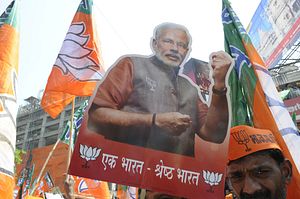The numbers are still coming in but the outcome is already clear: India’s National Democratic Alliance coalition, led by the Bharatiya Janata Party, has taken a clear parliamentary majority in India’s national elections which were held over the past few weeks and will determine the 543 occupants of the next Lok Sabha — the lower house of India’s bicameral parliament. The NDA looks set to win 329 seats, marking the largest parliamentary majority held by a party since Rajiv Gandhi’s Congress won big in 1984. The BJP alone appears to have won 274 seats, exceeding the 272 mark needed to hold a majority in parliament. The party’s majority has historic implications, marking the first time a non-Congress party has achieved the feat. The situation for the incumbent United Progressive Alliance coalition appears bleak, with just 63 seats to its name. The Indian National Congress alone has picked up 48 seats seats — less than a fifth of the BJP’s tally and almost on par with some of the more successful regional independent parties. With its strong majority, the BJP will succeed at electing Narendra Modi India’s next prime minister.
The BJP’s landslide victory is the result of a strong wave of anti-incumbent sentiment among Indian voters. According to NDTV, the UPA lost 171 seats from its 2009 tally and the NDA picked up 187 seats. Independent and regional parties lost 15 seats as well. The poor performance by the UPA allowed several regional and independent parties to put up a strong showing, ensuring that the dynamics of India’s new political opposition should be novel and not dominated entirely by the Congress party. Notably, Jayalalithaa’s All India Anna Dravida Munnetra Kazhagam has taken 36 seats, gaining 27 seats since 2009, according to NDTV. Furthermore, also according to NDTV, Mamata Banerjee’s All India Trinamool Congress has taken 33 seats, gaining 14 from 2009. Other independent parties with a relatively strong showing include Naveen Patnaik’s Biju Janata Dal with 13 seats and the Telangana Rashtra Samithi with 12 seats. The nascent Aam Aadmi Party, led by Arvind Kejriwal, has taken 5 seats.
The Indian National Congress has already conceded defeat on behalf of the UPA. The landslide victory for the BJP signifies that Indian voters yearn for change and see a Narendra Modi government delivering better governance, economic growth, and less corruption. Furthermore, the Congress Party lacked a powerful personality to lead its campaign in the same way that Narendra Modi did for the BJP. Modi’s humble background and strong-man persona resonated with Indian voters. The Congress has long been dominated by the Nehru-Gandhi family, resulting in a form of dynastic politics that Indians now see as outmoded and unfit for modern India. Notably, Rahul Gandhi, the scion of that dynasty, appears to be locked in a close battle for a parliamentary seat in Amethi, running toe-to-toe with the BJP’s Smriti Irani. In addition to Gandhi’s close race, several prominent INC names including Kapil Sibal, Minister of Law and Justice, and Salman Khurshid, the External Affairs Minister, lost their parliamentary seats.
The BJP’s massive margin of victory might yield a new type of Indian politics, effectively reducing parliamentary barriers to passing new legislation. With 274 seats, the new prime minister and his party will be able to maneuver whatever measures they see fit through parliament without the hassle of having to deal with often-fickle coalition partners or a recalcitrant opposition. It remains to be seen how the BJP will manage its coalition partners within the NDA. The smaller parties within the NDA, including the Shiv Sena and the Telugu Desam Party, might find their influence wane within the coalition given the BJP’s majority. Additionally, the outcome in the next Rajya Sabha (the upper house of India’s bicameral legislature) elections will likely moderate the BJP’s ability to wield power unchecked — the party is expected to be the minority in the Rajya Sabha.
Even before the NDA had conclusively reached a majority in parliament, investors took the took India’s SENSEX Index to an all-time high, bringing the Indian Rupee to a 10-month high against the U.S. dollar as well. Modi and the BJP are widely perceived to be able to succeed economically where the Indian National Congress failed. Although the BJP will not immediately reverse several of the Congress’ populist schemes that have driven the Indian government into fiscal unease, it is expected to address broader economic issues such as inflation and development. Part of Narendra Modi’s popular appeal is also rooted in his image as a politician free of the taint of corruption. During the UPA’s 10 years in power, several high-profile scams exposed corruption at the highest levels of Indian government, jading voters and driving them to the BJP.
Among Modi’s critics, concerns will persist about the future of India’s secularism and the fate of India’s Muslim minority. Modi’s record as the chief minister of Gujarat has come under incessant scrutiny by observers both in India and abroad. Some allege that his complicity in the deadly 2002 Godhra riots that resulted in the deaths of hundreds of Muslims render him unfit to lead a country as pluralistic as India. Despite widespread concern, both in India and abroad, it appears that Indian voters have chosen to elect Modi on the merits of his economic vision rather than whatever his views towards India’s Muslims might be. The BJP as a whole is a Hindu nationalist party, influenced heavily by the often-militant Hindu organization, the Rashtriya Swayamsevak Sangh (RSS).
Overall, these elections demonstrate that Indian democracy is functional where it counts: holding a government accountable for poor political, economic, and social outcomes. It remains to be seen if the BJP will deliver what India’s voters want, but for now, the party seems to have won the broadest mandate of any single party in Indian politics in decades.

































